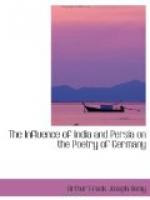The sixth book opens with the story of Muntasir, p. 198, (from d’Herb. vol. iii. pp. 694, 695) and then we enter the period of the Saffarid dynasty. Its founder Ya’qub is the subject of a poem, p. 207 (d’Herb. iv. 459). “Zu streng und zu milde” and “Schutz und Undank,” both p. 210, tell of the fortunes of Prince Qabus (Wilken, Sam. p. 181 and pp. 79-81, 91, 198-200, n. 47). “Die aufgehobene Belagerung,” p. 211, brings us to the Buyids (d’Herb. ii. pp. 639, 640). The story of Saidah and Mahmud, p. 212, is from Wilken’s Buj. c. xii. pp. 87-90, but the order of the events is changed. Then we come to the history of the Ghaznavid dynasty, in connection with which the story of Alp Tagin is told in “Lokman’s Wort,” p. 214, according to the account of Haidar in Wilk. Gasnevid. p. 139, n. 1, preceded by an anecdote told of Luqman (d’Herb. ii. 488). “Die Schafschur,” p. 215, gives a saying of Sabuktagin from the Tarich-i-Yamini (on the authority of ’Utbi, de Sacy, Notices et Extr. iv. 365). In the story of Mahmud’s famous expedition to Somanatha, p. 215, Rueckert has combined the meagre account of Mirchvand with that of Firista for the story of the Brahman’s offer and with that of Haidar for the sultan’s reply (Wilk. Gasnevid. pp. 216, 217, n. 109). “Mahmud’s Winterfeldzug,” p. 216, is also from Wilken’s book (pp. 166-168, n. 38); in fact Dilchak’s reply is a rhymed translation of the passage in the note referred to. From the same source came also the poem on the two Dabsalims, p. 219 (Wilken, Gasnevid. pp. 220-225). The familiar anecdote of the vizier interpreting to Mahmud the conversation of the two owls is told in Nidami’s Machsan-ul-asrar (ed. Bland, pp. 48-50), where, however, Anusirvan is the sultan. The title reads: [Arabic].[172] “Abu Rihan” (i.e. Albiruni) is taken from d’Herb. I. 45 and iv. 697.
Then follow stories from the period of the Saljuks: “Des Sultan’s Schlaf,” p. 224 (Vullers, Gesch. der Seldsch. pp. 43, 44); “Nitham Elmulks Ehre,” p. 228 (ibid. pp. 228-230); “Nitham Elmulks Fall,” p. 229 (ib. pp. 123-125 and pp. 128-132); “Die unglueckliche Stunde,” p. 232 (ibid. pp. 153, 154). “Die unterthaenigen Wuerfel,” p. 227, is from the Haft Qulzum (Gram. u. Poet. der Perser, pp. 366, 367). The stories of Alp Arslan and Romanus, p. 225, and of Malaksah’s prayer, p. 228, are not given by Mirchvand, but occur in the works of Deguignes, Gibbon, Malcolm and d’Herbelot.[173] The story of the death of Sultan Muhammad (in 1159 A.D.), p. 232, is in Deguignes, ii. 260, 261.
Then we get stories from the period of the Mongol invasion. “Die prophezeite Weltzerstoerung,” p. 237, the legend of Jingis Chan’s birth, is in the Tarich-i-Yamini (Notices et Extr. iv. pp. 408, 409). The material for the poems concerning Muhammad Xvarazm Sah, p. 237, and his brave son Jalal ud-din, pp. 240, 241, is found in the work of Deguignes (op. cit. ii. p. 274 and pp. 280-283). Finally we are carried even to India and listen to the story of the unhappy queen Raziyah, p. 255, who was murdered at Delhi by her own generals in 1239 A.D.[174]




